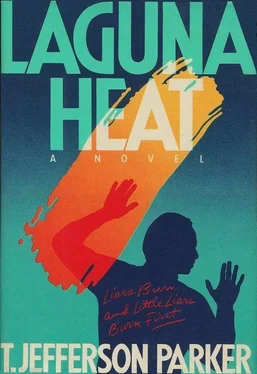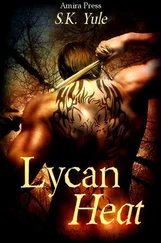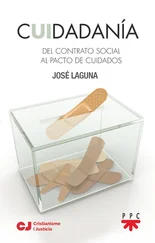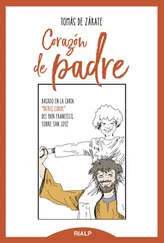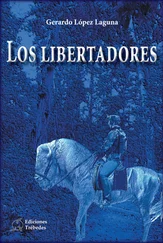“Well, that’s fine, Tom. I’m really happy for you.”
“Don’t be. It’s all a lie.”
“I know.”
“I moved back to Laguna.”
“You should be happy there.”
“Like to see you sometime, Lou. I think about you.”
“Maybe, Tom.”
By two he was asleep, and not long after accosted again by the imminent nightmare in which Morris Mumford pitched over dead on the grass while a cop tried to keep his own insides from spilling on the sidewalk. In the dream, as it had happened in reality, Shephard stood and peed his pants while his ears rang and the pistol in his hand grew too heavy to hold up any longer.
Early the next morning Shephard called on Jane Algernon. Her house was on Laguna Canyon Road a half mile west of her father’s stables, tucked under a massive willow tree that cast shade over the entire front yard. He smelled the strong odor of fish and heard croaking sounds as he approached. There was a chain-link pen in front of the house containing a cement pool, a slippery animal of some kind, and a young woman wearing thigh-high rubber boots over her pants. She was bending toward the animal, offering a tidbit. Shephard guessed fish. The animal slipped into the water and the woman turned. She was large and pretty, and her dark hair was pulled away from her face.
“Seal?” he asked.
She looked at him like he didn’t particularly matter. “Sea lion. You must be police.”
“Detective Shephard.” The sea lion surfaced and croaked. She tossed a fish into the air and the sea lion surged to meet it. “Can we talk?”
“Go ahead.”
Shephard felt a chill, and it wasn’t just the shade of the willow. “I’m very sorry. You have my condolences. Did your father live alone?”
“My mother died twenty-six years ago of cancer. He lived alone.”
“What kind of man was he?”
She flipped another fish toward the animal and smiled when it was caught again mid-air. The smile froze when she turned back to him. “I don’t know. He ignored me, I ignored him. I’ll tell you I loved him as much as any daughter can love a father. It was just better done at a distance, that’s all.”
Shephard lit a cigarette. “Frozen fish?”
“Fresh frozen.”
“Of course. So, you can’t tell me what kind of man he was?”
Jane Algernon sighed and put her hands on her hips. “A gambler and a drinker,” she said. “That’s how much I can tell you. Those are the kinds of things you need to know, aren’t they?”
“Oh, yes, definitely,” he said, pulling the notepad and pen from his pocket and scribbling nothing on the page. In matters of friendly questioning, Shephard had learned that preconceptions were something to be used. Played up. Street talk for street people, tough talk for people who watched too much TV, confidential talk for those who fancied themselves in the know, condolences to the needy few who turned to the police for sympathy and a shoulder to cry on. But people like Jane Algernon were the hardest: their superiority demanded submission. “Since he had the stables, I wonder if horses were what he gambled on.”
She studied him briefly, then threw another fish, fresh frozen. The sea lion backpeddled with a croak, knocking his head on the cement siding. Shephard winced.
“Horses, football, fights. It was always that way. If you know Laguna, you won’t have to ask me where he booked.”
“Oh, you must mean Marty’s Sportsplace.”
“Tell Marty hello from me. It’s about time he got some pressure.”
“It sounds like you don’t care much for Marty.”
“I don’t care for people who run others down, or those who snoop around after and try to clean it up,” she said.
Shephard scribbled. “That’s me, isn’t it?” Her back was to him and she didn’t turn around. He noted that her hair was held up by two chopsticks that caught the faint light streaming through the willow. Her legs were long and looked trim where they disappeared into the boots. When she bent down to get another fish, her arms were dark brown on top and lighter underneath. She had tucked her blouse into the khaki pants and the material stretched against her back as she stooped. She is beautiful, he thought.
“That’s anybody, detective.”
“Did he have any enemies? Anyone who might want to take his life?”
“If I thought there were, I’d have come to you first, wouldn’t I?”
Shephard realized that he was getting nowhere, and that even in the mind of a mourning daughter who was bitter about things there would be a wealth of information, any crumb of which might prove useful. It was often the crumbs he needed most. Jane Algernon was miles away from offering any. He scribbled dramatically, flipping over a page, referring to it, then scribbled some more.
“What are you writing when I haven’t told you anything?”
Shephard looked up and found her blue, angry eyes boring into him. “Just what I see,” he said, finishing the entry with a flourish.
“And just what do you see, detective? Besides a hungry sea lion who would like the rest of his lunch.”
“I’ll tell you, Miss Algernon. First I see your father. Since you say you ignored him, you might want to know what he looked like before yesterday morning.” Shephard called to mind the picture in Tim Algernon’s bedroom. “He was a big man with a healthy head of gray hair and a love for horses. Loved to ride them, feed them, talk to them. Maybe they were something he loved even more after your mother died. People focus a tremendous amount of love on animals sometimes, especially lonely people. It’s a safe, easy love because animals don’t demand much. But still it’s love. I see him betting horses and drinking Jack Daniels, probably too much of it. I see him tired of running the business and selling off a dozen animals he loved and hated to see go. I see him saddling up that last mare, what was her name...?”
“Rebecca,” she said, her voice bordering on fury.
“Rebecca, but he liked to call her Becky. Anyway, they would wander off through the canyon. That’s this canyon right here. Then, of course, I see what happened to him. I see him sprawled in the gravel outside the house he’d owned for forty years, a rock the size of a grapefruit planted in his brain, a thousand plus dollars in bills stuffed down his throat, and his entire body ruined by fire.” From where he stood, Shephard could see that Jane’s face had colored to an angry shade of red.
“Then I see you, his daughter, who lives walking distance from the stables. I see him drunk and saying things to you that you don’t like. I see you watching him lose his money at the track. Feeding sea lions is a good profession, but it’s like mine in that you don’t make much money at it. You wondered why the dollars went to the track instead of down the road a bit. Bear in mind this is just speculation, Miss Algernon. I see you thinking he drank your mother into an early grave. I see you not quite forgiving him for it all the way. The last part of what I see I shouldn’t bore you with, but you did ask. I see a daughter too full of guilt to admit she loved her father, and too angry at him to admit she feels betrayed. Too ashamed of herself for not doing anything to help him — and how could she? — to really try now that she has the chance to. I see a woman whose left chopstick is about to fall out.”
Her hand shot to her head and poked the dangling stick back into place.
“And, of course, I have to see me, too, since I’m here. I see a cop with a patch on the back of his head who has to walk up to this woman and ask a bunch of questions she doesn’t want to hear. He wants to hear them even less, but he believes in certain fundamental things, and one of those is that killers shouldn’t go free. So he asks the questions. He gets no answers, and quite frankly he feels a bit foolish. When a beautiful woman makes a man feel small, he feels real small. But he is a professional. He wants answers, he needs help. He scribbles a bunch of shit in a notepad hoping she’ll think he’s as dumb as he acts, and she’ll finally have to ask him what he’s writing. And you did, Miss Algernon.”
Читать дальше
